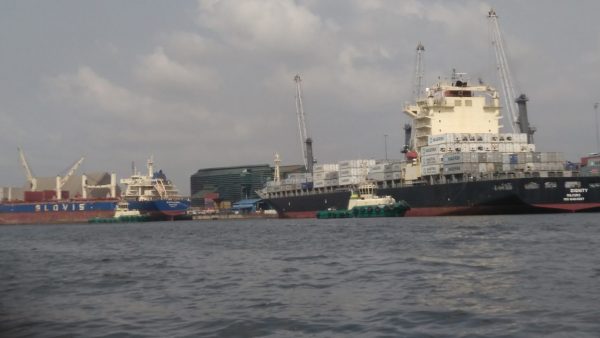FRSC – NPA: A Partnership With 300% Cost Burden

Since the early 1900s, trucks have played a very important role in helping countries develop and become prosperous, in particular helping create a fairer distribution of wealth and jobs between urban and rural areas. Almost everything in our homes or offices has, at one point of its production or distribution, been on a truck. So, the prosperity of a nation is still delivered by an efficient trucking system despite the emergence of railways and its potentials.
Road transport today carries, on average, more than 80% of inland freight volume. More than 6,000 billion tonnes of goods are transported each year by road in the EU, USA, CIS, China and Japan alone. In modern economies, 85% of road freight tonnage is carried over distances of 150km or less – along routes for which no other form of transport would be realistic. Less than 1% gets carried over 1,000km.
Road freight transport directly creates a lot of jobs – 6.5 million in the EU and nearly 9 million in the USA. And that’s not including jobs in truck-related industries, such as vehicle manufacturing, repairs, retail, leasing, or insurance, nor the millions of other jobs that depend on trucks to supply and distribute goods.
In Nigeria, trucks are arguably the most popular means of commercial transportation owing to the underdevelopment of the nation’s rail system as well as the ability of trucks to carry both large and small goods.
Trucks are responsible for the carriage of goods from the nation’s seaports to their various destinations across the country and as the only freight vehicle that can transport goods directly to the door, trucks benefit from being both flexible and reliable. Not only is this type of vehicle vital for businesses in Nigeria, but for employment too.
However, the new Memorandum of Understanding (MoU) signed between the Nigerian Ports Authority (NPA) and the Federal Road Safety Corps (FRSC) to enforce the minimum standards of trucks operating in the ports in order to curb the cases of accidents may throw the nation into more economic crisis from the trucking perspective.
Last year, NPA introduced a clean-up system to checkmate trucks that access the ports, insisting that only roadworthy trucks certified with an NPA sticker (which attracts a 10,000naira annual fee) should be allowed into the ports.
Despite the rebellion by most truck owners, the system was successfully implemented. However, the criteria for obtaining the NPA sticker failed the litmus test as most rickety trucks at the ports eventually got the NPA sticker. This makes one begin to wonder if the covert reasons for the introduction of NPA truck sanitization exercise was to exploit the truck owners whilst generating more revenue for the Authority.
While most truck owners are yet to fully understand the essence of the N10,000 annual NPA levy, the new MoU between FRSC and NPA on standardization of trucks has led them to commence plans to increase their fares by over 300% in order to meet the requirements of FRSC which could see each truck spend close to N50,000 on speed limiters and also pay N10,000 for annual NPA charge.
The Chairman of the Association of Maritime Truck Owners (AMATO), Chief Remi Ogungbemi revealed this during an exclusive chat with MMS Plus last week even as he recalled the sad experience that befell many truck owners following the introduction of the annual N10,000 NPA levy in 2016.
According to the AMATO Chairman, FRSC’s inspection of trucks before they are allowed into the ports is a duplication of duties already carried out by Vehicle Inspection Officers (VIO) as well as the NPA minimum truck standards which was introduced last year.
“FRSC is to begin certifying trucks before they are allowed into the port which is the same thing NPA did last year. Besides there are agencies that are in charge of checking vehicles to ascertain the roadworthiness; that is the Vehicles Inspection Officer (VIO), why is FRSC coming to do the job of VIO?”
“While NPA is preparing to start 2017 annual collection of the N10,000 truck levy as registration for trucks that are operating in the ports; FRSC is also coming up with mandatory Speed Limiter which has money attached to it, about N48,000” Ogungbemi said.
He lamented that the goods coming into the ports have reduced drastically as a result of the economic recession. Hence, he disclosed that truck owners have begun negotiations that would increase their charges to commensurate with the challenges confronting them.
“If NPA insists on collecting N10,000 and FRSC is also coming up with speed limiter which connotes extra cost, we would add up these new costs and increase the cost of hiring our trucks. We are looking at about 300% increase so the public should be prepared for this and the ripple effect it would have on the nation’s economy.
Ogungbemi maintained that if trucks have to be standard, monies would be spent in order to make them standard and everything has increased.
“The tyres we were buying for N40,000 – N50,000 before is now N150,000. Diesel was just over N100 per litre before but it has increased to N300 per litre. We have considered all these and we have to raise our fares to commensurate with these factors” he added.
Meanwhile the President of Truck Fleet Owners Association (TFOA), Mrs. Folake Soji-George has lamented that her association wasn’t carried along in the critical decisions that led to the MoU between NPA and FRSC.
It should be recalled that the Truck Fleet Owners Association (TFOA) was the only Truck Association that partnered with the NPA during the truck standardization exercise last year.
Folake noted that TFOA which has over 50 members, mostly corporate companies with at least 10 trucks each, were not in any grief as a result of the development. She however shared Ogungbemi’s concern that the increase in the prices of spare parts, diesel and other commodities; coupled with the drop in the volume of activities in the ports should lead to increase in truck transportation fares.
According to her, the issuance of NPA sticker was mismanaged; resulting to a mix-up and the idea of minimum standard of trucks wasn’t fully adhered to.
“Minimum standards for NPA this year when we begin the registration would have to be better. NPA has to put structures in place that would ensure that they checkmate on the issues they had last year like giving NPA stickers to non-roadworthy trucks” Folake said.
However, she implored the FRSC to be considerate and not rigorously demand that all truck equipments must be in place and functional.
“Trucking business is an investment that most people use to survive as a means of livelihood. While there is need for these trucks to be in order especially on certain things like brakes but FRSC should know the situation in the country to understand that we may not meet up with the many criteria. So, there are things that require them to put human face and accept”, Folake said.
Speaking during the signing of the Memorandum of Understanding (MoU) with the FRSC in Lagos, Ms Usman said the NPA was responsible for protection of lives and properties of all stakeholders accessing the ports, hence the need to ensure that all articulated vehicles and trucks which freight containers and assorted bulk cargoes to different parts of the country from the ports meet the required minimum safety standards.
Ms Usman said that NPA’s collaboration with the FRSC was part of efforts to put lasting solutions to the Oshodi-Apapa expressway gridlock and make the roads safer.
She stressed that NPA’s collaboration with the FRSC and other safety enforcement agencies to was to achieve safety standard for trucks accessing the ports by adopting the Road Traffic Safety Standardization Scheme ( RTSSS), which include regular inspection and certification of the NPA’ fleet.
“Apapa for example, is home to Nigeria‘s two foremost ports which are being managed by nine terminal operators. Between the two ports, more than 65% of dry cargoes and about 90% of the nation’s liquid (petroleum products) are handled. This is because it hosts about 35 tank farms in addition to the numerous other businesses that are located in this port city.
“Going by the operational activities highlighted above, there is always heavy vehicular traffic around all port locations and most of these vehicles are not in good state. This debilitating vehicular traffic has assumed a frightening dimension in so many port areas. It has led to serious accidents that have claimed innocent lives and several man hours’ lost in traffic jam. Miscreants in arm robbery and other social vices have been on increase because of the perennial traffic situation in those areas” she said.
The current haulage rate for a 20ft container within Lagos is about N40,000, while a 40ft container ranges between N50,000 to N100,000 depending on the distance. An increase of 300% as purported by truck owners would see prices for haulage of 20ft container within Lagos increase to N120,000 and N150,00 to N200,000 would be charged for convey 40ft containers within Lagos.
Transporting a 20ft container to other states would also increase from N300,000 to as much as N900,000 depending on the distance from Lagos and the price for a 40ft container would also skyrocket from N400,000 to around N1,200,000.
The brunt of this increment would be felt by the freight forwarders who are likely to transfer this cost to the importers, hence the final consumers suffer from increased prices of several products.
This new development leaves a lot of questions unanswered like; whose job is it to certify trucks that do business at the ports- is it NPA, FRSC, VIO or Shippers’ Council? What are the criteria for measuring the standards of these trucks? How did rickety trucks end up with the NPA sticker which the standardization campaign was meant to prevent? How much damage would the increment trucking cause to the nation’s economy? How soon before these truckers go on a strike as a result of these unwholesome taxation?
Don’t miss the part two of this report as we try to answer some of these questions with contributions from the freight forwarders, truckers and a detailed economic implication of this FRSC- NPA MoU.
By Kenneth Jukpor








